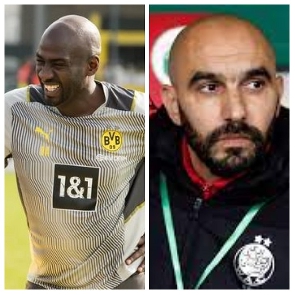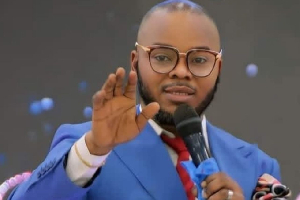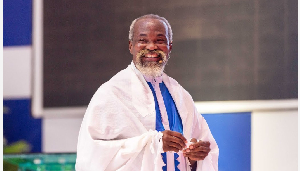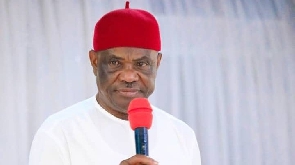Walid Regragui at first glance is not a household name in African football. After all, he is a French-born Moroccan whose professional football career straddled the French Ligue 1 from Toulouse, through Ajaccio to Dijon and Grenoble.
In keeping with the Maghrebi tradition of procuring their Diaspora-born players from Europe, he played 45 matches for Morocco. So how did he get to the dizzy heights of taking Morocco to the semi-finals of a World Cup?
“Avocado Head” as he is known in Morocco, became an assistant on the Moroccan National team in 2012 after his playing days ended. In 2014, he took up a job at a mid-table team FUS Rabat. By 2016, he had won the league championship of Morocco popularly names the “Botola.
In 2020, he left FUS to join Al Duhail, and by 2021, he was the indisputable choice to take up the job of coaching the Atlas Lions, after the rather irascible Vahid Halihodzic was fired for his inability to control the dressing room and alienating marquee players like Hakim Ziyech and Soufiane Boufal to name a few.
The first thing he did upon assuming the mantle of managing the Atlas Lions was to bring together all the “rebels” and dissident players and over one on one meetings and several visitations he reminded them about the sense of purpose that it took to represent the flag.
He managed to bring back the aforementioned players and most importantly commit them to the Jersey of the Atlas Lions.
The result. In a short space of 4 months, he has taken a team that bombed out of the AFCON to beating Belgium, Spain, and Portugal on their way to the Semi Final of the World Cup. A feat never equaled by any African team.
Whether the Atlas Lions win on Wednesday or not against their former Colonial Masters, they will have etched their names in history as pioneers in the same way the 1986 team led by the likes of the iconic Badohu Ezaki, Aziz Bouderbala, Mohammed Timoumi and goal poacher extraordinaire AbdelRazzak Khairi achieved another African first by qualification for the round of 16 in Mexico.
Worthy of note is that they smashed a Portuguese team sporting the likes of Paolo Futre, Manuel Bento, and Antonio Souza 3-1…That victory was not just as emphatic as the scoreline suggested, it also marked a sea change in how the world saw African football.
Africa’s meager quota in the world’s biggest sporting event was raised to 3 from 2. As I write they may well have earned Africa another 2 places in the revised allocation to CAF in the 2026 World Cup from 9.5 to 11.
The lessons we in Ghana can learn from the example of Morocco is intuitively obvious. Appointing a respected former player, with national team experience who has managed a club side with success should be a basic requirement.
Often we lose sight of the fact that a National Team manager is just that! A manager of egos of the best players of the nation. If the manager doesn’t have stature, and confidence and cannot manage the egos of the tattooed, testosterone-laden, often narcissistic players who each see themselves as their own version of Adonis, there is no way he succeeds.
In sharp contrast with Ghana, the appointment of Otto Addo as a coach as well-intentioned as it may have been checked some of the boxes but not the most important ones.
Even though he is a Ghanaian of diasporan origin who had played for the Blackstars at both AFCON and the World Cup. Even though he had a coaching license and had assisted at Hamburg, the Blackstars, and was now hunting youthful talent at BVB Dortmund, he lacked coaching experience at the club level.
That is the experience you need to manage egos. Period…So he didn’t have the cahonies to select a team for the World Cup that was bereft of influence from certain quarters. He didn’t have the cahonies to make the right changes at the right times and indeed he was confronted twice by Andre Ayew in the open view of television cameras when he was replaced. That was a stark reminder that he didn’t have the respect of certain primadonnas in the team.
Perhaps the most important factor, however, was the fact that Otto Addo had unbeknownst to most Ghanaians negotiated a part-time contract to manage for only the World Cup period. That meant that he really didn’t have skin in the game. He was a mercenary who was only in to build a CV attendant with a financial reward.
That was a moment of indiscretion that the FA need to take responsibility for. It was not lost on many observers that when Otto Addo was asked in a press conference who he thought was going to win the World Cup he responded emphatically “Germany”…That was a shocking response.
It’s showed a subconscious that didn’t really give a hoot about committing fully to the job.
Compare and contrast that with Regragui who stated before and during the tournament that he believed Morocco would win the tournament. That in a nutshell is the tale of two “cities” of your will. A tale that encapsulates the results we got at the World Cup.
Going forward, we must learn from the unfortunate underperformance that the Black Stars have yet again delivered and look forward to a future where the Black Stars coaches will be selected based on set criteria, given achievable goals, and most importantly, avoid individuals who have no commitment to the course and are often maleated by ulterior forces whose interest lie more with infusing the national team with their players for future profits from sales and onward sale clauses.
Our team has a real future. If we can adopt the Regragui doctrine and bring our best and brightest players together under a manager they will respect with minimal interference from hidden hands, the sky is the limit for our Black Stars.
Sports Features of Wednesday, 14 December 2022
Source: Geraint K Jones













